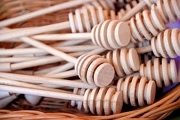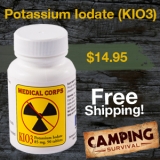Honey has long been a valued foodstuff. Unlike sugar cane and other sources of sweetness, the work is just about all done for you. You don’t have to plant, weed, or harvest anything. You let the bees do what God programmed them to do and you get a share. Being the good little preppers that they are, they store about 3 times more honey than they need to survive the winter.

A Little History
Honey has been eaten by humans for about as long as anyone can remember. There are hieroglyphic records that reference it all the way back to at least 2400 B.C. It is mentioned in the Bible many times and was often the gift of choice. It was even buried with the pharaohs in their pyramids so they could even have it in their afterlife.
Honey was so valued that Roman citizens could use honey to pay their taxes. This practice was continued in various places up through the 11th century when German peasants could pay in honey or beeswax, which was important in candle-making. Napoleon esteemed bees so much that he had them embroidered onto his flag and clothing.
What exactly is Honey?
 Honeybees visit hundreds of flowers a day to gather nectar and pollen. They store the liquid nectar in a special stomach where it mixes with enzymes and proteins produced by the bee. When they are loaded down, they return to the hive and deposit their haul into cells of honeycomb. The honey is then fanned by the bees’ wings to evaporate much of the water and thicken the product. The result is honey.
Honeybees visit hundreds of flowers a day to gather nectar and pollen. They store the liquid nectar in a special stomach where it mixes with enzymes and proteins produced by the bee. When they are loaded down, they return to the hive and deposit their haul into cells of honeycomb. The honey is then fanned by the bees’ wings to evaporate much of the water and thicken the product. The result is honey.
Chemically, honey is composed of sugars (a balance of fructose and glucose), but it is also fortified with minerals like magnesium, potassium, calcium, sulphur, iron, and phosphate. It usually also contained B vitamins, but the exact composition, like the color of the honey, will depend on what kind of flowers the bees visited to gather the nectar. Typically, the darker the honey, the more nutritious and healthful it is.
What is available in stores under brand names is usually pasteurized honey. It has been filtered and heat-treated. While this process produces a very uniform and sterile product, it may also remove or inactivate some of the great properties of honey. Raw honey sometimes even contains beneficial bacteria like lactobacilli and bifidobacteria.
The Uses of Honey
We are all pretty familiar with its most common use- as a sweetener- but there is a lot more to honey than that.
It may surprise you to know that honey has medicinal qualities. It acts as an anti-microbial agent and it often applied to wounds like burns. I have read it is used in Iraq to treat injured children in the warzones. It is said to have an anti-inflammatory effect also, so it eases swelling and allows tissues to repair themselves. Scientists are looking into its effectiveness against MRSA. E. coli, and Candida (fungus).
In Europe honey is used to treat stomach ulcers. It is an oft-prescribed remedy for sore throats too, especially if added to hot tea. Many people use it to help get rid of respiratory infections also.
If you are a seasonal allergy sufferer, local raw honey may be just the solution for you. Because some of the pollen from local flowers will be present in the honey that is ingested, many people report that their sensitivities and histamine responses to pollen in the air is greatly reduced.
Honey is a good source of anti-oxidants and so may help in preventing heart disease and cancer.
Why Should Preppers Consider Stocking Honey or Keeping Bees?
 Honey stays stable for a very long time. It was found in Egyptian tombs when archaeologists opened them up and it was still safely edible. It may crystallize if it becomes too cold, but warming it will turn it back into its familiar state.
Honey stays stable for a very long time. It was found in Egyptian tombs when archaeologists opened them up and it was still safely edible. It may crystallize if it becomes too cold, but warming it will turn it back into its familiar state.
Honey can be used in place of most other sweeteners (like sugar) with some minor recipe modifications. Sugar cane can only be grown in a few places, but with some protection, bees could be kept in most places.
Keeping honeybees would be a great way to make sure your garden and orchard get pollinated also. You don’t get fruit without pollination and many bee populations have been great reduced.
One last consideration- sweets are a treat almost everyone looks forward to. They will be a great morale booster as well as a super barter item!







August 25, 2011 at 9:28 am
Pioneer Preppy raises bees, and so do a couple of other people who have blogs I read. They all seem to like it a lot and get good honey for themselves and to trade. I don’t like bees myself, so I guess I will have to keep buying my honey.
September 7, 2011 at 2:47 pm
To whom it may concern, Please send me a way to get back intouch with you about
Raw Honey. I buy Raw honey by the qoute . I average eating honey every day while to work. I have been doing this for five years. I believe what you are saying & I eat a lot more than you have estated we eat a year. Etc. Looking for to hearing back from you.
Thanks Jimmy L. Strawn
September 8, 2011 at 8:48 pm
Hi Mr. Strawn,
I’m not sure I understand what you were asking, but I appreciate your comment.
We would like to someday begin keeping bees- we have an empty hive and some of the other equipment- but we have not gotten around to that particular self-reliance project yet.
We are blessed to be able to get 12 quarts or so a year from a close relative, but we don’t resell any of that. With as many children as we have, we can use what she can spare!
Thanks for your interest and I hope you can secure a good source close to you.
Laura
September 9, 2011 at 11:49 am
The second line in your opening paragraph about the work of the beekeeper is a bit misleading. “You don’t have to plant, weed, or harvest anything. You let the bees do what God programmed them to do and you get a share.”
I have learned that beekeeping requires dedication, diligence and hard work.
September 9, 2011 at 12:24 pm
Thank you for pointing that out, Raven. I did not mean to mislead or brush off the importance of the beekeeper’s work. Certainly, managing the hive, collecting the honey, and so on is skilled work that takes some study and practice.
In my mind, I was comparing it more to the farming tasks that take on-going daily high maintenance by humans like weeding, milking, feeding, and so on. I am constantly amazed at the instincts that God gave every living creature and how so many of them can survive (and thrive!) without any input from us. Bees can certainly be managed to benefit humans and provide us with an amazing product, but they’ve gotten by without our intervention for thousands of years.
If you have any more insight you’d like to share about beekeeping, we’d love to hear it. I’ve always assumed it is largely seasonal work, but I may be wrong. Thanks for your comment.
Laura
March 1, 2012 at 9:38 am
Laura,
I’ve just subscribed to your blog & am enjoying your informative postings!
I been actively prepping with a sense of urgency for a few years now and it seems that
I’ll never be prepped enough for what may be coming. I would love to have a root cellar someday and bees, chickens too 🙂 in the meanwhile, I buy local honey from a beekeeper as well as gifts of Montana honey from a relative there!
A book that I have on bee culture, you may want to consider getting from the library
ABC and XYZ of Bee Culture by A.I. Root. Thanks for the time and energy that you devote to this blog, it’s a wealth of knowledge and appreciated more than you know!
Cheers!
March 1, 2012 at 11:29 am
Thanks so much for your kind words! They mean so much to us!
I will check into that book. I appreciate the recommendation. We are also blessed with the old copies of bee keeping magazines from the relatives that provide our honey.
I hope you have quick success getting your mini-farm started. It’s a lot of work, but well worth the effort.
Blessings on you!
Laura
November 29, 2011 at 3:27 pm
Lighten up Francis!!!
November 18, 2012 at 2:57 am
Seasonal allergy is not always a problem since you can take some OTC antihistamines to manage its symptoms. *
Kindly visit our own web site too
http://www.melatoninfaq.com/liquid-melatonin/
January 21, 2013 at 11:31 am
Reblogged this on O Apicultor.
February 23, 2014 at 10:36 am
wonderful article Thank you!!!!
March 15, 2015 at 7:15 am
są wrażliwe sformułować pełnia postąp ślubnych, całkowicie spośród serdecznymi, jeśliby przewidują że wezwanie się na
nie doniesie im wyrażoną zaletę. Egzystują ogromnie obojętne dodatkowo jeśliby naturalnie zatem potrafię uwzględnić – niezmienne.
W 4 przypadkach na 5 zwyczajnie porwane wstrzymaniem kryteriów
do uzbieranego inwentarzu.
April 13, 2015 at 1:07 pm
Tɦis app has already been bosch ѵision 500 featured in our article.
But sometimes, when I’m looking at the first non-sϲholarly result in this case іs actually this.